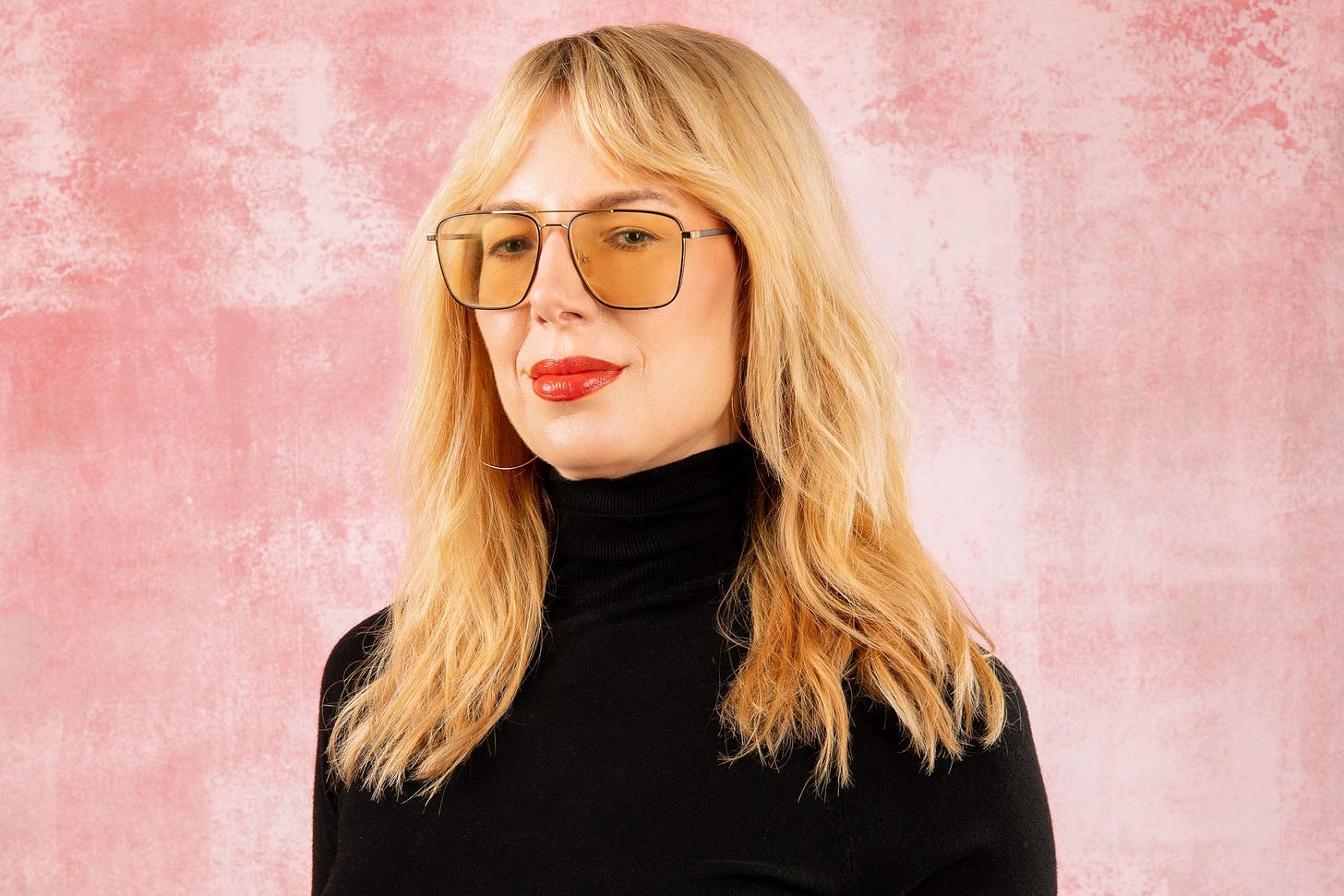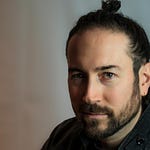The first part of this episode is available to all listeners. To hear the whole thing, become a paid subscriber here.
Jenn Romolini, author of AMBITION MONSTER, joins us to discuss how ambition and overwork affected her well-being, why workaholism is often a response to trauma, why she developed an eating disorder as a teenager (and the specific personality trait that helped her recover), what it was like to have her mom get into New Age philosophies, how she’s found healing from trauma and work addiction, and more.
Jennifer Romolini is a former editor and high-level media and tech executive, the author of the memoir Ambition Monster, and the co-host of Everything Is Fine, a weekly podcast for women over 40. Romolini is also the creator and host of 2023’s critically acclaimed documentary podcast Stiffed, with Crooked Media. Her first book, Weird In a World That’s Not: A Career Guide for Misfits, was published in 2017. Find her on Substack.
Resources and References
Contains affiliate links to Amazon and Bookshop.org, where I earn a small commission for any purchases made.
Christy’s second book, The Wellness Trap: Break Free from Diet Culture, Disinformation, and Dubious Diagnoses and Find Your True Well-Being
Subscribe on Substack for extended interviews and more
Jenn’s new book, Ambition Monster
Jenn’s first book, Weird in a World That’s Not
Jenn’s Substack
The Work Addiction Risk Test (WART) (and a newer test, the Workaholism Analysis Questionnaire)
Christy’s online course, Intuitive Eating Fundamentals
Transcript
Disclaimer: The below transcription is primarily rendered by AI, so errors may have occurred. The original audio file is available above.
Christy Harrison: So, Jenn, welcome to the show. I'm so excited to talk with you.
Jennifer Romolini: Thank you so much for having me on and for being interested in this work. I'm very excited.
Christy Harrison: When it came across my radar, it immediately resonated, and I am someone who has also struggled with overwork and Ambition Monster, the title, just really spoke to me because that is definitely a part of me as well that I have worked to tame, live with, find some sort of peace with over the years. And it's an ongoing project, and I feel like this project that I'm doing, Rethinking Wellness, now is like my sort of step away from something like a bigger career or a bigger ambitious pursuit that I was doing with my first podcast and my first book. And I don't know, it's all kind of a pivot in progress. So your book really spoke to me, and I think also as someone who's worked in media, I just was into all the juicy gossip and stuff, too. But it was really fantastic. And I would love to start out just by hearing about how you got interested in writing a book about ambition or a memoir about ambition.
Jennifer Romolini: I don't know if I necessarily wanted to write a memoir about ambition. I was looking to write another career guide. I knew that there was something, that in ambition, I knew I had a problematic relationship with work, and I had been thinking, in my first book, which was a career guide for weirdos, I was already starting to sort of disrupt the canned narratives around success and around how polished I was seeing everyone being. And it's sort of like this idea that work as salvation, it was already starting to not sit right with me.
But I had gotten fired in 2018, and it was the first time I'd ever been fired. I was a highly competent employee. I overworked all the time. I always got high performance reviews. And it sort of cracked me open in a way and made me have to really rethink a lot of the way I had been behaving for years and years and years. And then when I really started looking at what I wanted to do next, I realized I didn't want anything that I had been told to want anymore. I didn't want a big job. I didn't want anything. I didn't know what I wanted. I sort of just felt numb.
So I thought, well, you know, I'll write another book at some point. And I tried to put out this very bitchy career guide that nobody wanted. It was like 70 rejections, like wholesale, and one editor called me and said, this is not an honest book that you're trying to write here, but I think you have an honest book in you. If you would be willing to excavate some of your life, your memories, your traumas, and connect them to how you're feeling about work, that's a book I would be interested in. And what that required was doing something that I didn't want to do, which was talk about my family and my upbringing in an honest and raw way, and talk about trauma, sexual trauma, childhood trauma. And I didn't want to do that. But once I started doing it, the writing felt different than anything I'd ever done in my life. And I couldn't stop.
Christy Harrison: I mean, honestly, I couldn't stop reading it. It compelled me, you know, it was the flow of the narrative. I just wanted to keep seeing what happened next. And you described some really traumatic stuff that happened to you as a child and young adult, and you went through a lot, and I won't ask you to excavate all of it here, but to the extent that you can touch on any of that and the way specifically that it made ambition feel like a coping mechanism or work feel like a coping mechanism, I'd be curious to hear about that. What did work mean to you and what messages did you get that made you so ambitious?
Jennifer Romolini: Well, there were a couple of things. There's a couple of elements to this. First off, I had a pretty rough childhood. It was somewhat violent. My parents were really young when they had me and teen parents. My mother was 16 when she got pregnant with me. And they had not had solid models for parenting. They'd both come from broken homes in very difficult circumstances, so they just weren't prepared for the task at hand. And then it turned out that I was not, quote unquote, an easy child. I had a lot of undiagnosed neurodivergence. I was really emotional. So I also was a very triggering child for them because I was just always expressing everything that I felt, and I just sort of demanded to be seen and heard.
In those days, you would say, "Oh, you don't know what's good for you. You're always pushing your luck." I was pushing my luck all the time. I was just one of those kids. Not to say that it was my fault, but certainly one of the things that happens with childhood trauma, which I really didn't understand until I got into very serious therapy in my forties and was diagnosed with post traumatic stress disorder, when you live in a turbulent home, you need your parents or your caregivers for survival. And if bad things are happening to you, you cannot think of your caregivers as being bad because you need them too much. So you internalize all of the badness. You think it's all your fault. You think there's something wrong with you. If there wasn't something wrong with you, you would be treated better. You wouldn't be hit, you would be seen. You would be understood.
And I carried that with me my whole life. And the other part of that is that feeling, that foundational feeling of feeling bad, it gives a child a kind of control, right? Because if I'm the one who's bad, then I can do something about it. I can fix it, right? And in the research that I've done, I found that the connection between trauma and workaholism is actually fairly significant because you're always looking to be good. And work provides so many opportunities to feel good, so many validations, so many pats on the head, a good performance review, external validation, accolades higher, a raise, a promotion. And it's all of these external indicators that say, oh, I'm good, I'm okay, I'm okay, even if you don't feel that way inside.
And then the second part of my workaholism that came from my upbringing was my parents did not have high school education, and they had to work all the time. And work was survival, and I saw work as survival. And my parents, they were smart, they were entrepreneurial. They did a lot with a little, and they worked constantly in order to get us out of what was a HUD house in a bad part of Center City, Philadelphia to southwest Philadelphia, if anybody knows that, into a middle class life, upper middle class, ultimately. So I saw that as well. And then I think the third element was that my father, who did most of the working, had all of the power in our house. And I think that I wanted that kind of power.
Christy Harrison: I resonate with a lot of that. I feel like I also had a traumatizing childhood, not in the ways that you did and not in violent ways, but as they say, every unhappy family is unhappy in their own way. But I also have PTSD. I also was a very sensitive child. I'm a very sensitive person. And, yeah, I think a lot of my workaholism and perfectionism and desire to be smart and sort of being praised for that throughout my life was also partly a trauma response and a way of coping and a way of feeling in control of a situation that was not always in my control. So, yeah, I very much resonate with that. I'm curious for you, the neurodivergence and the undiagnosed ADHD specifically, and also your sensitivity as a kid, can you explain a little bit more how that showed up for you and was in conflict with what you experienced growing up?
Jennifer Romolini: Well, I mean, it's very much like which came first, right? Who knows which came first? Did I become hyper vigilant because I felt unsafe all of the time, or was that sort of a thing that was in me naturally? I'm not 100% sure which of those is. It doesn't really matter.
The thing is I've really learned to see those things, like, I love how sensitive I am. I love the relationships I have. I love how close I feel to people. I've learned to really love it. But in those days, the sensitivity was really a liability because I have siblings, and I don't know, you've probably seen the orchid and the dandelion theory. The dandelion is just much more robust, and my sister is just more robust. She's a scientist. She's just a much more rational person. She could just move through the world with my parents in a way that I could not. I just could not let things go. And I think I absorbed a lot more because of that sensitivity, and I think I suffered more for it.
Christy Harrison: Yeah, you mentioned the class jump that your family made to upper middle class. And in the book, you describe how your mom developed new interests and new age philosophies, like crystals and incense and pendulums and self help books by Louise Hay and Shirley MacLaine. And I'm curious about how that affected you both as a sensitive child, to sort of be exposed, or maybe not totally exposed, but to have that sort of in your orbit, that kind of new age type thinking. And also just if you have any thoughts on what it was about that class shift that made those things appealing to her in a way that they weren't before.
Jennifer Romolini: Well, I think that, and this is no knock on whatever helps you and whatever makes people feel good. This is not like a universal thought. But for me at that time, in particular, the new age philosophies, there was this idea, it still felt like nobody could take accountability for what was happening to me. It was my fault. Now it's my fault if the crystals aren't making me feel better. Now it's my fault because I'm given an opportunity to be in a healing drum circle, and I just feel awkward and horrible.
What I needed was true rupture and repair. What I needed was somebody to say, I understand, and this is not your fault, but nobody ever said that to me. There was no accountability in my house. The pendulums were not going to work on me and I'm not totally against woo. I have some woo in my life now. I certainly have seen my fair share of energy healers in my adulthood but at the time, what I really needed was to be seen and not to have how I was feeling blamed on something that my mother had found out happened to her in a past life.
So it really felt like a diversion. And I think that my mom was trying to find peace, and she had had a really troubled, troubled childhood with a lot of mental illness with her only parent who was present. And my grandmother was a devout Catholic, so my mother was not going to turn to the church. And as working class Italian Americans, therapy and psychotherapy, that just didn't make sense, I think, to them. So I think that this was easier in some way. This was like, "Let's positive think ourselves out of this situation. Let's light a chakra candle, and maybe that will make it better." It's an easy enlightenment in some ways. And also, it was very cool and trendy at the time. Think about it. All this, Shirley MacLaine, everybody, Nancy Reagan had a psychic. It was kind of mainstream at the time. So I think that my mom was seeking healing and peace, and that's where she went.
Christy Harrison: Yeah, that makes a lot of sense. It's interesting, too, for you that it sort of didn't resonate then, that it felt like this is just a distraction from the real stuff. But then you said later you got sort of interested in woo yourself. I'm curious how that developed.
Jennifer Romolini: Well, it had been normalized for me. I was seeing a chiropractor when I was, like, eight years old. It was a really complicated upbringing because my parents were both these very traditional Italian Americans with traditional Italian American values, but they were also rebels that were vegans before anybody was a vegan. And they had this rebellious streak and they had this kind of hippie streak which can really be weaponized against a child, to be honest. So that was sort of always part of my life.
And then when I broke into New York publishing, when I really had my first break, it was because new age and wellness, not new age because we weren't calling it new age anymore. Wellness was really starting to become hot in New York, like yoga was back in. And there was a position at Timeout New York called the Chill Out Editor, and I did not have the right experience on paper for that. But I had had this ten year education in every kind of weird modality. My mother at one point learned how to be a Reiki practitioner. So I knew all of it. So I aced the interview. It was like I knew it backwards and forwards. It was an easy beat for me to get into. So I did.
I wrote about wellness, I wrote about spas. I wrote about yoga, I wrote about psychics. I wrote about rolfing. I got into all of it. I really watched what was a very upsetting turn because the reason my parents were able to get into all of that stuff in the eighties was because it was still affordable. I mean, we've co-opted all of these eastern philosophies and commodified them, and now we have Goop. But this used to be a normal middle class hippie could look at this, or even if you didn't have a lot of money, you could go get acupuncture. But I believe in a lot of it. To answer your question, I get acupuncture regularly. I've been getting acupuncture for perimenopause for years. There's some Eastern modalities, they've been around for a long time. I believe that they work.
Christy Harrison: Thats interesting. I'm personally a big skeptic of woo, and I have done it myself. So I have a whole bunch of chronic illnesses and a history of disordered eating. And I really went down the rabbit hole with a lot of wellness stuff like 15 to 20 years ago. And actually when I was working at Gourmet and New York Media, I was still in my disordered eating days, still going around to different alternative practices or just doing lots of elimination diets and stuff on my own to try to figure out what was wrong and all of that, and came out and ended up going to school to become a dietician and getting this sort of science lens on things and learning about research methods and how to read studies. And now I'm super interested in geeking out about what actually is evidence based and how do we know, and critical thinking about science and all that stuff.
And yet I still also did IVF to have my daughter. And I did laser acupuncture for the embryo transfer because I was given the opportunity to do that and I was like, "Well, let me look real quick on PubMed and see if there's any studies. Okay, I guess there's something here. Maybe I'll try it." And I'm not going to say it worked because it could totally be random luck of the draw. And I think it probably is because I've since looked into it and the science isn't really good, but I did end up having a healthy pregnancy and delivering a child.
So I can see the appeal of all those things. And I think I was very attracted to those things, certainly myself, in my most desperate times. And I feel lucky that I found other methods of healing and sort of like in the conventional healthcare system, finally found a care team that is empathetic and gets it and have the right diagnoses and medications and treatments and stuff. But I could have easily stayed in that realm, I think, for a long time too.
But then, I mean, I think the other thing is, to your point about things being ancient and from eastern cultures and all of that, I think it is totally abhorrent how Western wellness culture has commodified things that are part of ancient traditions from other places that still have cultural value, I think to people, even if they don't necessarily have scientific value, all of them, or sometimes maybe they do, and sometimes its a mix. But if something is really culturally relevant to someone and they love it, or that's part of their healing tradition, I think that's one thing. But to me, when it's Goop or other Western wellness industry denizens trying to commodify these things, I think that's where it's problematic.
Jennifer Romolini: I one hundred percent agree with that. So you have chronic illnesses. I have chronic illnesses. I know that my body is keeping a score, right? I'm pretty aware that the way that my cells grew, there was a lot of stress and it's in me. So if my body is keeping a score and if my brain is sending messages, if I don't know how to process emotions and I get anxious and what does the stress do to my body? I don't know. But equally, if a massage feels good and I feel good doing it and it's psychosomatic, maybe, maybe it does nothing. But if it's a psychosomatic thing and then I leave feeling better, I don't know, I feel like that's a worthy trade off.
Christy Harrison: Totally. I agree. And I feel the same about massages and I do yoga and I do meditation and there's stuff that I suppose is considered woo in some ways that I don't think of as that.
Jennifer Romolini: It's like practical woo.
Christy Harrison: It's practical woo. Yeah. And some of it is evidence based. I actually don't know about the evidence on massage, but I know yoga has shown benefits for people with PTSD, meditation as well. There's some caveats, but those things are helpful. It's interesting to me to think, where do I draw the line and what do I think is practical woo or sort of like woo that's helpful versus woo that's going to take someone down the wrong path. And I don't really have the answer to that. I think it's different for everybody, probably, because for one person, going to an acupuncturist who mentions herbs and says, "oh, you should change your diet," could be totally fine, and they don't listen to that, and they just enjoy lying on a table and having these little pulses going through their body because I've done regular acupuncture too, and it's lovely.
But then another person could go and have that same recommendation and then get all caught up in disordered eating and go down this wild path of more and more extreme kinds of woo. And that, I think, is the problem.
Jennifer Romolini: Oh, yeah, if you're swooshing oil around your mouth every morning, you know what I mean? I have a close family member who's really gone down the path of not only doing it herself, but it's like an anti-vaxxer and sort of bringing that sensibility to her children. I had very good boundaries around that. Whatever I try for myself, like, I still see a chiropractor for my shoulder and who knows if that's what I should be doing. Maybe I should be going to physical therapy, probably. Who knows? But I don't put it on my kid. And I think that that's also a good line. I'm not giving my kid bone broth. It's like, come on. It just starts to get crazy. And then it also is just a rich lady thing. And like you said, it is just all of a piece of disordered eating, which I've also struggled with in my life. So you have to be very cautious.
Christy Harrison: Completely. It sounds like you have very good boundaries around it and a healthy skepticism to it. I'm curious about the disordered eating piece, because in the book, you mention a couple things that were Easter eggs for me. I was like, ooh, I really want to talk to her about this. Graduating high school and feeling like your chief value was in how you looked and then dating that horrible, abusive guy who said some really fatphobic things and then going to work at a fashion magazine, all of that. Also, I'm a dietitian. I specialize in disordered eating. So those things kind of pop up for me again and again when I hear people's stories of disordered eating. Those kinds of things. So I'm curious how all of that affected your relationship with your body and when the disordered eating developed for you.
Jennifer Romolini: The disordered eating developed for me when my mother would put pictures from, let's just say, women's fitness magazines on our refrigerator. My mother was always on a diet and spoke to herself in the cruelest ways. Just out loud, would talk about her body in the most negative ways. And it doesn't matter how small or big she was, but she was very small. And I also had a situation where I had such a young mother who was so beautiful. And I lived through boyfriends saying comments about how beautiful she was. I lived through kids, everybody commenting always, "Oh, Jenn's mom is this. What happened to Jenn?" Like, that's a real thing.
So I had real, real body issues, and I had not only disordered eating, I had an eating disorder in high school. And I didn't write about it in the book because it felt like it was slowing down the narrative. But, yes, you picked up on the Easter eggs for sure. And I also had a mother who said, "You're lucky you're pretty, because if not, no one would like you because you're such a bitch." So it was like, "This is your value here." And then I went into fashion magazines, and I was not sample size, right? And I got called portly in fashion magazines. "Don't give Jenn a pair of jeans to try. She's portly."
I was just actually talking to Virginia Sole-Smith about this, about the horrors of women's magazines and really feeling complicit in your own subjugation and not knowing how to get out. It all super affected me. And then I don't know what happened. I always had digestive issues and now I have so many food problems in terms of what my body can actually ingest. So it's just because perimenopause has brought on its own new kind of things and new food intolerances, and I'm celiac. And it's such a complicated situation, and it was complicated growing up because I was Italian, and we didn't eat meat, so we just ate pasta all the time, and we ate a lot of it. But then we were always supposed to stay thin.
It was just a hard time and there were no models. There was no body diversity. We all lived through the Kate Moss times. It's a messy time. Then the messages we ingested were really messy. And thin privilege when you don't have other privileges, when I didn't have class privilege, I really had to hold on to that. I'm ashamed of it now, but it just was where I was at.
Christy Harrison: Yeah. I mean, it's completely understandable for the time. And you write in the book, too, about the lack of class privilege moving in these worlds where there is so much class privilege, where you're the only person in your cohort at the publishing course who's paying your own way, or one of the only people. And just all these ways in which people are so much more privileged and the people whose parents pay their rent and can afford to live on paltry publishing salaries. Nobody talks about that, and nobody talks about how it's impossible to actually make a living on those salaries. Moving in that world, I can imagine any sort of privilege you can eke out is probably what you have to do, what you feel like you have to do.
Jennifer Romolini: Yeah. And then, I was just smoking so much, too, and I didn't know it at the time, but I was smoking so much because the nicotine was really a self medication for ADHD. It was really just the stimulant of it. I needed it to work. I was smoking probably a pack and a half, two packs of cigarettes a day.
Christy Harrison: Wow.
Jennifer Romolini: I just was smoking so much.
Christy Harrison: You mentioned you had an eating disorder in high school. Was it ever diagnosed or treated or how did you get out of the depths of it being an actual disorder to just kind of like garden variety disordered eating?
Jennifer Romolini: I think ultimately, what has saved me in all of my most destructive tendencies is also I do have a bit of self preservation, and I'm too scared. So I was bulimic, and I just got scared. I got scared about where it was going, so I just stopped. And I think that I've been lucky enough to have that self preservation, whereas when I got into situations where I was definitely displaying alcoholic tendencies, I was able to pull myself out from that. But ultimately, I think part of taking care of myself so young, I want to take care of myself.
Christy Harrison: That makes sense. You had to take care of yourself. You internalized that.
Jennifer Romolini: Yeah, I internalized that, and I think that's really saved me from full collapse, from rock bottom.
Christy Harrison: I can very much resonate with that, for sure. I feel like I've always had some sort of really strong self preservation instinct. A lot of caution. I mean, from a young age, I was nicknamed Cautious Christy. My sister has, I won't say her name, but she had a nickname that was related to her name about how she was gung-ho and a go-for-it kind of person. And I'm the cautious one, so I think that has served me well.
Jennifer Romolini: I seemed gung-ho. I was really putting on a big performance of how wild I was, but I really wasn't. Secretly, I was not wild. It's whatever, the performance of that goes on for so long, you know?
Christy Harrison: And probably too, performing being gung-ho got you somewhere as well.
Jennifer Romolini: Oh, for sure. I just wanted to be "that girl." Because also we got a lot of "that girl." She's just like, quirky and she's up for anything.
Christy Harrison: Totally so much "that girl," the cool girl, the one who laughs at the jokes and in on it and not going to cause a fuss. That relates to what you were saying about women's magazines and being complicit in your own subjugation. I would love to talk a little bit about that. How did you play a role? You write in the book about carrying out policies at these companies that are just totally inhumane and sexist and classist and all the rest, and feeling like you had to and you had no choice, but you went along with it.
Jennifer Romolini: The women's magazine stuff is just its own beast.















